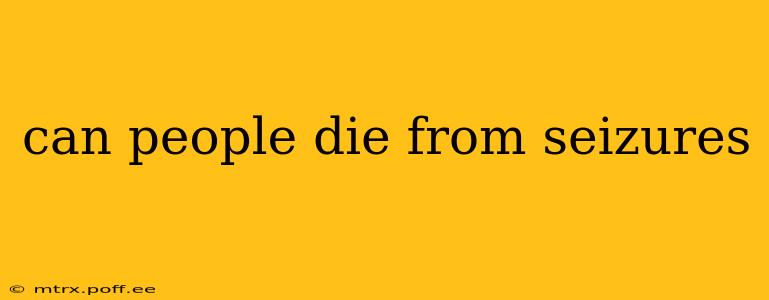Can People Die From Seizures? Understanding Seizure-Related Mortality
Seizures, while often manageable, can be life-threatening in certain circumstances. The answer to the question, "Can people die from seizures?" is a complex one, with the possibility of death depending on several factors. While many individuals live long and healthy lives with epilepsy, it's crucial to understand the potential dangers and what constitutes a medical emergency.
What Causes Seizure-Related Deaths?
Death directly resulting from a seizure is relatively rare, but it can occur. The most common causes of seizure-related mortality include:
-
Sudden Unexpected Death in Epilepsy (SUDEP): This is the leading cause of death in people with epilepsy. SUDEP is the sudden, unexpected, non-traumatic, and unwitnessed death in individuals with epilepsy that hasn't been explained by other causes. The exact mechanism behind SUDEP isn't fully understood, but research suggests it may involve disruptions in heart rhythm and breathing during or after a seizure.
-
Status Epilepticus: This is a prolonged seizure lasting more than five minutes, or a series of seizures without regaining consciousness between them. Status epilepticus is a medical emergency and can lead to brain damage, respiratory arrest, and death if not treated promptly. It's crucial to seek immediate medical attention if a seizure lasts longer than five minutes.
-
Injuries During a Seizure: Falls, head trauma, and choking are potential dangers during a seizure. These injuries can be severe enough to cause death, particularly if the individual is not in a safe environment.
-
Underlying Conditions: Pre-existing health conditions can increase the risk of seizure-related death. For example, individuals with heart conditions or respiratory problems are more vulnerable to complications during a seizure.
-
Drowning: People experiencing seizures can lose consciousness and potentially drown if near water.
How Can I Reduce the Risk of Seizure-Related Death?
Several steps can be taken to mitigate the risk of seizure-related death:
-
Proper Medication Management: Working closely with a neurologist to manage epilepsy medication is crucial. Consistent medication adherence is vital for seizure control and reducing the risk of status epilepticus.
-
Identifying Seizure Triggers: Keeping a seizure diary to identify potential triggers (stress, sleep deprivation, alcohol consumption, flashing lights) can help individuals and caregivers take preventative measures.
-
Safe Environment: Creating a safe environment at home and in other frequently visited locations is important to reduce the risk of injuries during seizures. This might involve removing tripping hazards, installing grab bars in the bathroom, and using padded floor mats.
-
Emergency Plan: Developing a comprehensive emergency plan, including having readily available emergency contact information and knowing how to respond to a seizure, is crucial.
-
Regular Medical Checkups: Regular checkups with a neurologist are essential for monitoring seizure control and addressing any potential complications.
What Are the Signs of a Medical Emergency During a Seizure?
It's essential to call emergency services immediately if someone experiences:
- A seizure lasting longer than five minutes.
- Difficulty breathing during or after a seizure.
- Injury sustained during a seizure.
- Loss of consciousness that doesn't resolve.
- Seizures occurring in rapid succession.
Can Seizures Cause Sudden Death in Healthy Individuals?
While rare, seizures can occasionally cause sudden death even in individuals without a pre-existing diagnosis of epilepsy or other health conditions. This highlights the unpredictable nature of seizures and the importance of seeking immediate medical attention if a concerning seizure occurs.
In conclusion, while many people with epilepsy live long and healthy lives, the potential for seizure-related death exists, primarily due to SUDEP and status epilepticus. Proactive management, a safe environment, and prompt medical attention are crucial factors in minimizing these risks. This information is for general knowledge and does not constitute medical advice. Always consult with a healthcare professional for any concerns about seizures or epilepsy.
